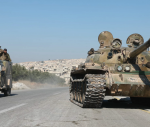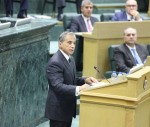You are here
Daesh taking on allies and enemies
Oct 14,2015 - Last updated at Oct 14,2015
Firmly established in Raqqa, northeastern Syria and northern and western Iraq, Daesh feels confident enough to take on allies as well as enemies.
It benefited from Ankara’s open-door policy for foreign fighters seeking to join Daesh in Syria and Iraq, and toleration of Daesh agents gathering Turkish recruits in their country’s cities and towns.
Now, Turkey experienced its most devastating suicide bombing at the hands of Daesh.
Last Saturday’s strike had the same forensic profile as a bombing that killed 34 at Suruc, near the Syrian border in July, and a strike that slew four at a rally of the leftist Peoples’ Democratic Party (HDP) in the Kurdish majority city of Diyarbakir in June.
Furthermore, the press reported that Yunus Emre Alagoz, the elder brother of Abdurrahman Alagoz, perpetrator of the Suruc attack could be one of the Ankara bombers.
The younger Alagoz was a 20-year-old ethnic Turkish Kurd who spent six months with Daesh in Syria last year. His equally committed brother soon followed him to Syria to join Daesh.
A friend of the two men, Orhan Gonder, who also was a Daesh recruit, was involved in the Diyarbakir incident.
It is significant that the targets of all three bombings were rallies staged by supporters of the HDP, a pro-Kurdish, liberal, secular party.
Daesh has a grudge against Kurds because YPG Syrian Kurdish fighters have turfed out Daesh from strategic Ain Al Arab (Kobani) and a broad belt of territory along the Turkish border.
The Kurds backed by Arab groups deemed “moderate” by Washington have been urged to mount a fresh campaign to close the strip of border between Kobani and Efrin (north of Aleppo), cutting off Daesh access to Turkey, by linking up the two Kurdish held areas along the frontier.
US planes have parachuted small arms and munitions to these groups to provide arms for the likely offensive.
This prompted a strong protest from Ankara, which regards the YPG as a branch of the Turkish Kurdish Workers Party (PKK) that has been battling the Turkish army for 30 years with the aim of obtaining autonomy for the Kurdish majority southeast.
It must also be noted that Turkey’s governing Justice and Development Party (AKP), the ally of the entire range of insurgents in Syria, was deprived by HDP of its parliamentary majority in the June election.
In response to the attack at Suruc on a group of socialist Kurdish and ethnic Turkish peace makers, the government abandoned the peace process with the PKK and bombed PKK fighters based in Iraq and southeastern Turkey, reigniting the war that had paused for negotiations.
As far as the AKP is concerned, anything that hurts the Kurds, and isolates and demonises them is positive.
The AKP seeks to eliminate the HDP in the November 1 rerun of the parliamentary election.
HDP co-chairman Selahattin Demirtas not only blamed the government for ignoring Daesh’s activities in Turkey, but also accused some in the security services of complicity.
He told CNN that it would not have been possible for Daesh to carry out such a devastating attack without support from “elements within the state”.
He pointed out that the person who placed the bomb in Diyarbakir had been detained “shortly before the attack and then was released by police officials. He later carried out the attack” and the officers who had held him were promoted.
His accusations are hardly far-fetched. Last spring Turkish intelligence operatives were caught delivering arms to areas in northern Syria held by Daesh and Al Qaeda-connected Jabhat Al Nusra.
If and when Daesh is officially confirmed as the perpetrator of the mass bombing in Ankara, its action will be attributed to ungrateful blowback against Turkey in spite of its promotion and tolerance of Daesh since its emergence in 2013, anger against Ankara for using the US-led anti-Daesh campaign to launch a limited number of aerial bombing raids against Daesh targets in northern Syria, and possible complicity with pro-AKP elements in the security services who hate the Kurds and seek to ensure that the HDP does not pass the 10 per cent threshold to re-enter parliament in the coming election.
Daesh also targeted other states that have backed insurgent groups in Syria but joined the anti-Daesh coalition, although it is not clear whether the motivation is blowback or retaliation.
Last week, Daesh carried out an attack on an Aden hotel used as temporary headquarters by the pro-Saudi Yemeni government, killing 22 people.
Daesh also mounted four coordinated suicide bombings that slew 11 Yemeni loyalists and four United Arab Emirates soldiers.
It earlier staged bombings in the Saudi kingdom. The most recent was in August at a mosque used by security forces, killing 15.
Two Shiite mosques were hit by bombers in May with a total of 25 fatalities. The aim of these attacks was to foster sectarian conflict in the country.
Last November, Daesh chief Abu Bakr Al Baghdadi called on Saudi members of the cult to target Shiites. In June, a Saudi Daesh suicide bomber, Abu Suleiman Al Muwahhid, detonated his explosive vest at a Shiite mosque in Kuwait, killing 27 and wounding 227.
The Kuwaiti police arrested 29 Kuwaitis suspected of involvement in the attack.
Russia is facing straightforward retaliation for its latest intervention in the Syrian war.
On Tuesday, the Russian embassy compound in Damascus was hit by shells that may have been fired by Al Nusra, following a threat by the movement’s commander Abu Mohammad Al Golani, to strike Russians in Syria and the Caucasus as a result of its bombing campaign against Nusra and its allies.
Russian security services declared on Monday that they had prevented a “terrorist attack” on Moscow’s public transport system by extremists, some of whom had been trained by Daesh in Syria.
Moscow has made it clear it is on the alert for such attacks and intends to thwart them.
By joining the fight against Daesh and Al Nusra in Syria, Russia hopes to eliminate a number of the 2,000 Chechen fighters who have joined them.
There are reports of pro-Moscow Chechens forming “volunteer” units to fight Daesh on the ground.
Moscow reasons that it is better to tackle them in Syria than on their home ground in the Caucasus.












